Ivan Mykolaichuk
Birth : 1941-06-15, Chertoriya, Chernovitskaya oblast, Ukrainian SSR, USSR
Death : 1987-08-03
History
Ivan Vasylyovych Mykolaichuk (Ukrainian: Іван Васильович Миколайчук) was a Ukrainian soviet actor, producer, and screen writer from Ukraine. He is best known for playing the Hutsul Ivan in "Shadows of Forgotten Ancestors" (Тіні забутих предків) (1964), based on Mykhailo Kotsyubynsky's book of the same name. He received the Komsomol prize of Ukraine in 1967, and the title of Meritorious Artist of the Ukrainian SSR in 1968. He posthumously received the Taras Shevchenko prize.

Composer
The action of the film takes place in winter Kyiv. After a sleepless night, a young composer goes for a walk through a snowy city in search of inspiration for a new melody; its route passes against the background of many sights of the capital. On the way, the hero observes city life and nature, people, near the maternity hospital he pulls out a happy young father who has fallen into a coma, and he notices a girl in a trolleybus. She is in a hurry in her affairs, and the enthusiastic composer follows her relentlessly. And every sound he hears becomes part of a new melody for him. The finale of the film is a panorama of Kyiv to the song "Two Colors".

Screenplay
The action takes place in the Ukrainian Carpathians in the First World War. The plot - twists and turns of life's journey of the traveler, adventurer, traveling actor and philosopher Ivan Kalita.

The plot is based on genuine events: a tendency to abandon subversive activities and surrender of one of the leaders of the Ukrainian counter-revolutionary underground, coroner general Y. Tyutyunnik. The young Chekist Sashko Kovalchuk infiltrates the Kiev counter-revolutionary underground.
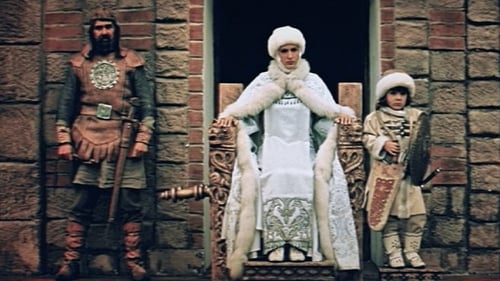
Volodymyr I Svyatoslavych
The film is a poetic adaptation of a series of stories (oral and written) about Princess Olha of Kyivan Rus' (Ukraine-Rusʹ) at the start of the 11th century. Inspired by chronicles and folk legends this is a story of a common girl Olha who married Prince Ihor and became his successor on the throne after his murder and one of the most remarkable political leaders in early medieval European history. She converted to Christianity and brought her realm into Europe.

Kurochka
Based on the works of Nikolai Gogol - 'The Old World Landowners', 'The Tale of How Ivan Ivanovich Quarreled with Ivan Nikiforovich', 'Ivan Fyodorovich Shponka and His Aunt'.

Screenplay
The Bukovynian peasant Rusnak leaves the poor Bukovynian lands and goes to Canada with his little daughter Orysia - maybe he will be lucky there? And now Rusnak using the services of "Inturist" goes to his land where he was once happy.

Director
The Bukovynian peasant Rusnak leaves the poor Bukovynian lands and goes to Canada with his little daughter Orysia - maybe he will be lucky there? And now Rusnak using the services of "Inturist" goes to his land where he was once happy.

Grigor Korchak
The Bukovynian peasant Rusnak leaves the poor Bukovynian lands and goes to Canada with his little daughter Orysia - maybe he will be lucky there? And now Rusnak using the services of "Inturist" goes to his land where he was once happy.
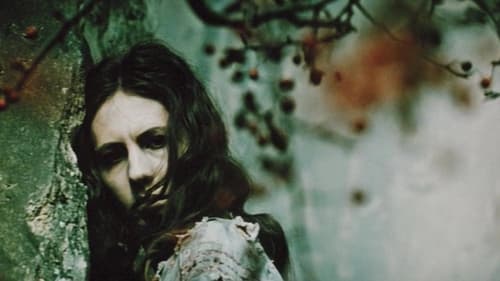
Mavka, a water nymph, loves Lukash, a country youth. Their brief happiness ends when Lukash is forced to marry the shrewish Kilina. The Spirit of the Forest turns Lukash into a wolf as punishment for his infidelity. The strength of Mavka's love breaks the spell, but Kilina curses the nymph, transforming her into a weeping willow. This beautiful and tragic story is based on a play written in 1912 by Lesya Ukrainka, a Ukrainian poet, writer and political, civil and female activist, and includes mythological characters taken from Ukrainian folklore.

Writer

Rusin
Soviet Ukrainian drama set in the Uniate Church in the years of World War II.

Fabian
The new reality changes the usual life in the village of Babylon. Attempts to communize the small town are met with resistance from the rich people living in the town. The Red Army finally puts down the resistance. Amidst the resistance philosopher Fabian returns to Babylon and tries to prevent bloodshed, but he meets a tragic fate.

Music
The new reality changes the usual life in the village of Babylon. Attempts to communize the small town are met with resistance from the rich people living in the town. The Red Army finally puts down the resistance. Amidst the resistance philosopher Fabian returns to Babylon and tries to prevent bloodshed, but he meets a tragic fate.

Screenplay
The new reality changes the usual life in the village of Babylon. Attempts to communize the small town are met with resistance from the rich people living in the town. The Red Army finally puts down the resistance. Amidst the resistance philosopher Fabian returns to Babylon and tries to prevent bloodshed, but he meets a tragic fate.

Director
The new reality changes the usual life in the village of Babylon. Attempts to communize the small town are met with resistance from the rich people living in the town. The Red Army finally puts down the resistance. Amidst the resistance philosopher Fabian returns to Babylon and tries to prevent bloodshed, but he meets a tragic fate.

дирижёр

Screenplay
The script about loneliness, conformity and the impossibility of creative realization scared the editorial censorship at the studio, and then at Derzhkino. A lot of claims were made against him. The demands for amendments and endless additions and rewrites by the authors lasted for about a year. The original version of the title "Na pokhony!" ("To bow down!") was replaced by "To Dream and to Live". According to Pylyp Ilyenko, the director's eldest son, this name appeared "as a result of censor pressure." Censorship stopped the tape 40 times: at the stage of the literary script, director's, during film tests (the actors were not approved), filming, etc. The film catastrophically fell apart into fragments, into masterfully filmed, but unrelated scenes. The director called the finished version a "dead film".

Vakula
Six years old Vitya lives with his parents in the Army base where he meets new friends and has a lot of adventures.

Joko
The movie takes us through the trials and tribulations of Petar I Petrovic, the man who united Montenegro in the 18th century and led them in the Battle of Krusi against a huge Turkish army to return victorious and pave the first path towards economic development.

(voice)
Documentary about the famous Ukrainian philosopher and poet Hryhoriy Skovoroda, which was banned by Soviet censorship. The film only reached the screens 15 years later, during Perestroika era.

Bayan
The film is in 3 parts: 1) 'Eden' - Aliens from the planet Rhea have flown with a damaged spaceship to Earth, looking for intelligent beings. They find apemen and take one of them into their ship. 2) 'The Wanderer' - A crime writer, who is travelling to see his dying friend, picks up a strange hitchhiker. On his return from the sanatorium, his car goes off the road, but the stranger lifts it into the air and lands it back on the highway. Then he goes to the writer's house and shows him his supernatural abilities. 3) 'My First Day' - Len, an alien traveler arrives on Earth to share with humans the knowledge of their ancient civilization. He meets its inhabitants, who are served by robots and travel back in time, because their life is boring and meaningless. Every day his hostess Lena visits an ancient Slavic settlement and monitors its inhabitants. One day she appears before the hunter Bayan, who has been captivated by her beauty and takes her into his hut.

Lyubomir
This film is based on the classic novel of the same name by writer Ivan Franko, one of the most famous figures of Ukrainian literature. It is set during the 1200s and the invasion of the medieval Ukrainian-Russian state of Rus' by Chengis Khan's Golden Horde. Due to its having been produced during the Soviet era, the story's aspect of class-conflict between the "heroic" peasantry and the "decadent" noble particularly emphasized here.

Original Music Composer
A family struggles to survive in an area that was claimed as part of Rumania, Poland and the Ukraine, all within a short span of time. When World War II comes, various family members choose different masters; some even choose to work for the Soviets. War, struggle, marriages, births, deaths--all these events punctuate the story of this large family.

Petro Dzvonar
A family struggles to survive in an area that was claimed as part of Rumania, Poland and the Ukraine, all within a short span of time. When World War II comes, various family members choose different masters; some even choose to work for the Soviets. War, struggle, marriages, births, deaths--all these events punctuate the story of this large family.

Writer
A family struggles to survive in an area that was claimed as part of Rumania, Poland and the Ukraine, all within a short span of time. When World War II comes, various family members choose different masters; some even choose to work for the Soviets. War, struggle, marriages, births, deaths--all these events punctuate the story of this large family.

Music
Folk comedy that tells the adventures of Ukrainian cossacks Vasil and Andrij as they set out on a long journey to deliver a letter from their leader to the Russian empress in St. Petersburg.

Vasyl, the cossack
Folk comedy that tells the adventures of Ukrainian cossacks Vasil and Andrij as they set out on a long journey to deliver a letter from their leader to the Russian empress in St. Petersburg.

Gromov
This ideologically charged film as a typical sample of Soviet version of history portrays the events in Ukraine in 1921 after the defeat of Ukrainian liberation struggle and the occupation of the country by invading Bolshevik hordes. The Bolsheviks are good guys and Ukrainian rebels refusing to submit to a new, this time Soviet, slavery are portrayed as bandits and brigands fighting against their own people.

Рей

The main motive of the film - a tragic love of Lesya Ukrainka to Marxist revolutionary Sergei Merzhinskiy. The film is about the poetess' trip to her beloved, in the literal and metaphorical sense at the same time.
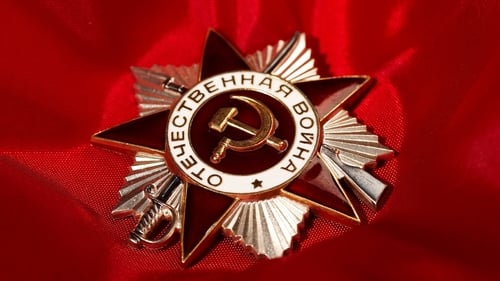
The "Fiery Arc" tells of a grandiose battle on the Kursk Bulge in the summer of 1943. Here was the largest tank battle in the history of World War II. Along with the personal fate of the heroes, the film shows battle scenes, the activities of headquarters and intelligence, those who worked at the front and in the rear.

Roman
This film is a romantic story of love between a Hutsul girl and wounded Soviet guerrilla Andrii whom she rescues from certain death. The events unfold against the backdrop of WW2 presented with many obligatory falsehoods of the imperial Russian historiography: heroic Soviet guerrillas, poor and backward Hutsuls, rich Hutsuls betraying their own people and collaborating with the enemy, Ukrainians incapable of their own agency. Crude and mendacious as it is, this ideology is relegated to the narrative background, and the viewer's attention gets quickly captivated by the artistic fortes of the film: riveting stage presence of Kostiantyn Stepankov, Ivan Mykolaichuk, Boryslav Brondukov and the debuting Ivan Havryliuk; gorgeously atmospheric photography of Mykola Kulchytsky, beautiful faces, language, and dress of the Carpathian Ukrainians, and a faithful presentation of Hultsul folk culture devoid of typically condescending Soviet colonial slant.

Kurganov
The Great Patriotic War. 1945 year. There are fights for the city on the Danube. The river is mined by the Germans, and this fetters the action of our troops. In addition, a city with a million people was left without food. And downstream are Soviet food barges. The command instructs the reconnaissance group a difficult and dangerous operation — to obtain from the enemy a map of the mined sections of the river, which requires penetrating into the city captured by the Germans.
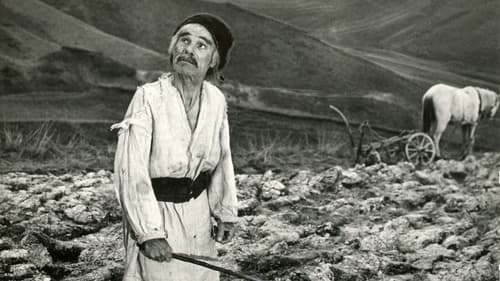
Mykola
Kaminnyi khrest (Stone Cross, 1968) told the powerful story of a proud farmer who decided to emigrate to Canada during the 1890s. The film captured moments shortly before the farmer set off for his voyage and had to say “good-bye” to his native village, friends and relatives. The internal conflict of the farmer in doubt about his decision became the central focus of the film. Like Vasyl Stefanyk’s novella that inspired it, the film is a meditation on the sense of one’s belonging, the sense of one’s own culture and what it means to abandon it.

David Motuzka
David Motuzka, demobilized Red Army soldier, returns to his native village, hoping to see the changes caused by the revolutionary events. But he cannot see no improvement. The village is ruled by the kulaks and David's childhood friend Kornii Matiukha helps them.

The dramatic story of the merchant's daughter, who became a brave fighter of the cavalry squadron of the red Army, later could not find herself in a peaceful life
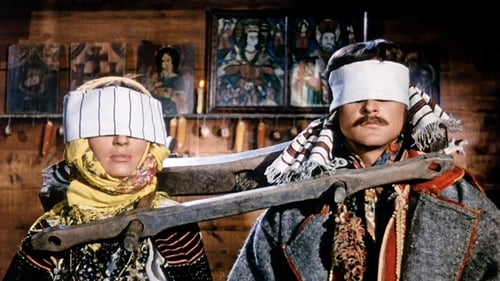
Ivan Paliychuk
In a Carpathian village, Ivan falls in love with Marichka, the daughter of his father's killer. When tragedy befalls her, his grief lasts months; finally he rejoins the colorful life around him, marrying Palagna. She wants children but his mind stays on his lost love. To recapture his attention, Palagna tries sorcery, and in the process comes under the spell of the sorcerer, publicly humiliating Ivan, who then fights the sorcerer. The lively rhythms of village life, the work and the holidays, the pageant and revelry of weddings and funerals, the change of seasons, and nature's beauty give proportion to Ivan's tragedy.
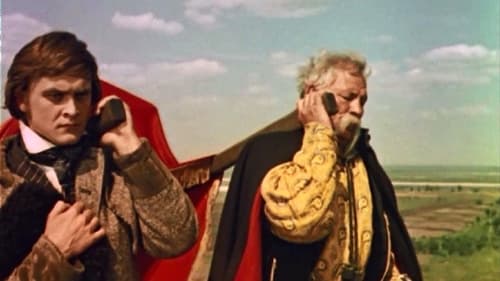
Taras Shevchenko
Poetic treatment of the early life of Ukrainian poet and painter Taras Shevchenko. A biopic made on the occasion of his 150th anniversary. It dwells on the first part of the Shevchenko's life leading up to the writing of his rebellious poem "A Dream" (A comedy). The film features the first appearance on the silver screen of the iconic Ukrainian actor Ivan Mykolaichuk (as Taras Shevchenko).















